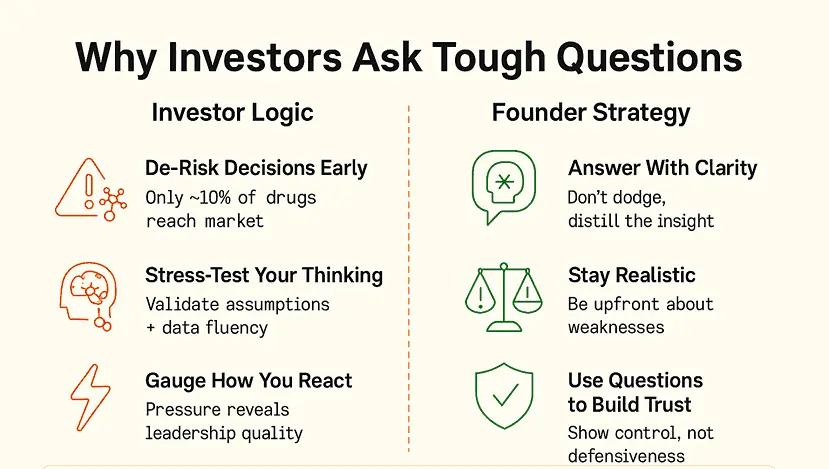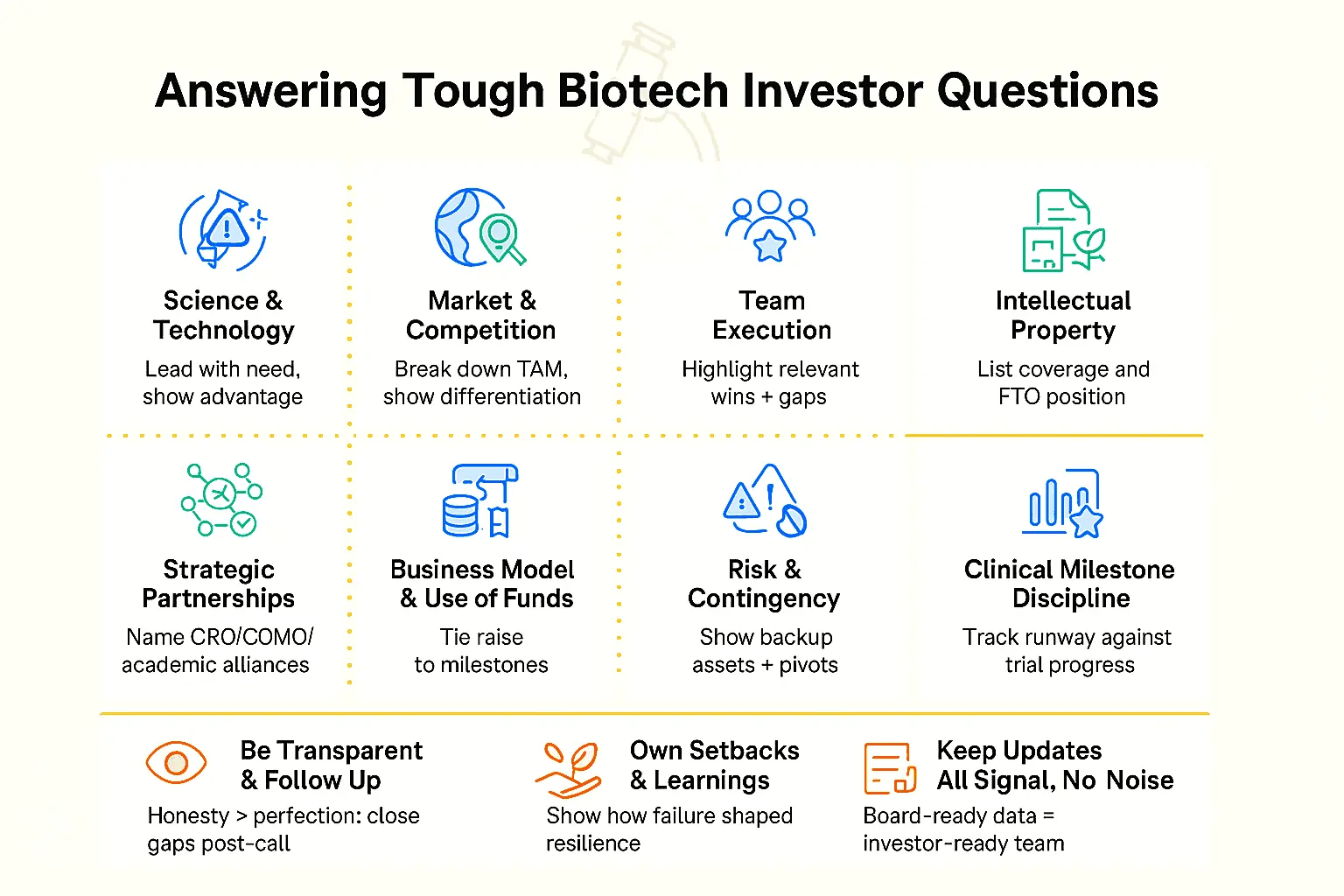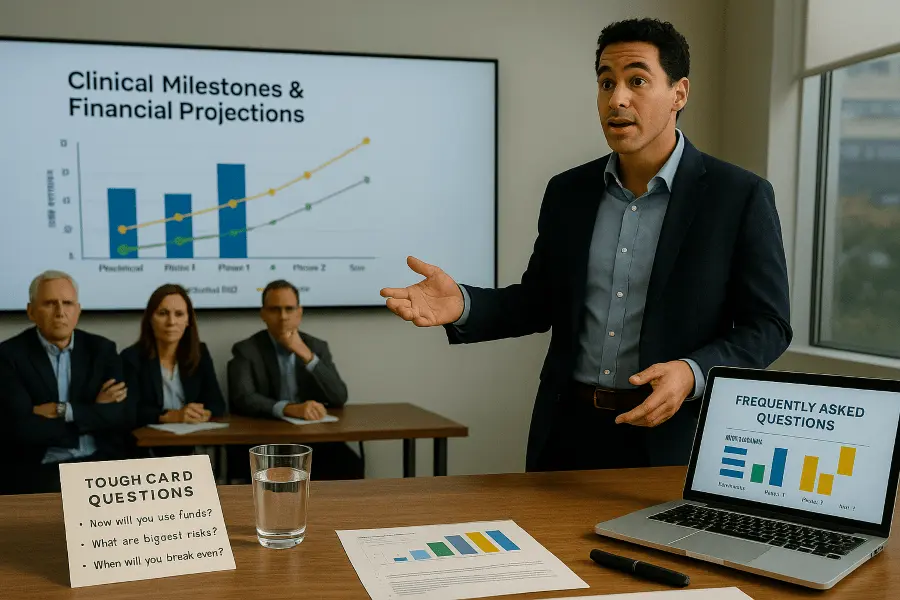Raising capital in biotech is a high-stakes game. Investors are cautious, the science is complex, and the road to revenue is long and full of uncertainty. Tough questions are guaranteed—and how you answer them often decides whether you close the round or walk away with nothing.
The scale of the competition makes this even sharper. In 2025, biotech startups raised $4.37 billion across just 26 large rounds, a sign that significant capital is available but concentrated in a relatively small number of companies. To earn a place in that group, founders need to understand how investors think and be ready to handle scrutiny head-on.
This guide is designed to help biotech founders prepare for, navigate, and confidently respond to the hardest investor questions, so you can build credibility, reduce doubt, and move your round over the finish line.
Why Investors Ask Tough Questions
Investors in biotech aren’t just writing checks, they’re stepping into a space where risk is the default. Drug development is expensive, timelines are long, and the odds are brutal. Industry data shows that only about 10% of drugs that enter clinical trials ever make it to market. That alone explains a lot of the scrutiny.

On top of that, the funding environment has tightened. Between 2021 and 2024, venture capital funding in the space fell from $30.8 billion to $11.7 billion, a clear sign that investors are becoming more selective and concentrating capital into fewer, de-risked assets.
Tough questions are how investors:
- Reduce uncertainty and stress-test your assumptions
- Check whether you really understand the science, the market, and the risks
- See how you think and behave under pressure
They’re also a character test. Investors want to know if you’re honest about your weaknesses, realistic about your challenges, and clear about your plan. The best founders don’t get defensive, they use tough questions as a platform to build trust, show command of the details, and demonstrate they’re the kind of leader who can navigate a very unforgiving industry.
1. Know Your Numbers and Data
Recent patterns validate the need for vigilance. In one quarter, first-time biotech financings dropped from $2.6 billion to $900 million. Preparation is vital as capital access becomes more competitive and selective.
Every claim you make should be backed by data. Know your preclinical results, market size estimates, financial projections, and timelines inside out. Have sources ready if you reference a statistic or study. Investors may dig deeper if they sense uncertainty or exaggeration.
2. Build a Clear, Cohesive Narrative
Your story should connect the science, the business, and the impact. Practice explaining your value proposition in one or two sentences. Avoid jargon, if you can’t explain your technology to a smart layperson, you’re not ready for investors. For tips on crafting your story, see mastering biotech startup funding strategies.
3. Develop a Milestone-Driven Plan
Investors want to see how their money will be used to reduce risk and create value. Break your plan into clear milestones (e.g., complete IND-enabling studies, preclinical work required for Investigational New Drug applications, initiate Phase 1, secure a key partnership). Link each milestone to a budget and timeline. This approach shows discipline and increases investor confidence.
4. Prepare a Data Room
Have all key documents ready for due diligence: patents, data, regulatory correspondence, financial models, and team bios.
5. Practice With Advisors and Mock Pitches
Rehearse your answers with mentors, advisors, or industry peers. Ask them to play the role of a skeptical investor and push you on the hardest topics. The more you practice, the more natural and credible you’ll sound in real meetings.
Strategies for Answering Tough Investor Questions in Biotech Fundraising
Let’s break down how to handle some of the toughest categories of questions, with sample answers and strategies.

1. Science and Technology
Investor: “What makes your approach better than existing therapies?”
How to Answer:
Start with the unmet need and the specific advantage of your technology. Use data to back your claims. For example:
“Our therapy targets a mutation found in 40% of late-stage breast cancer patients, where current treatments fail. In preclinical models, we demonstrated a 60% reduction in tumor growth compared to standard of care. No other therapy in development has shown this level of efficacy in this population.”
Securing funding often aligns with clinical progress. In Q3 2024, phase 2 investment increased to $5.2 million from $3.8 million in 2023. Advancing science prompts greater investor commitment.
Tip: If you don’t have head-to-head data, be honest and explain your plan to generate it.
2. Market and Competition
Investor: “How big is your addressable market, and why will you win?”
How to Answer:
When facing tough investor questions in biotech fundraising, break down the market by patient population, geography, and pricing.
“There are 200,000 new cases annually in the US and EU, with a projected market size of $1.2 billion. Our key differentiator is the ability to treat patients who have failed first-line therapy, which represents 30% of this market. We have strong KOL support and a reimbursement plan in place.”
Current projections highlight the sector’s expansion. By 2025, global biotech market size is expected to reach $546 billion, growing 13% from 2024. For founders, this signals broader opportunity and intensifying competition.
Tip: Show you know your competitors and what sets you apart.
3. Team and Execution
Investor: “What makes your team capable of executing this plan?”
How to Answer:
Highlight relevant experience and past successes.
“Our CEO led a previous oncology startup to a successful exit. Our CSO has 20 years of experience in immunotherapy and has published over 50 peer-reviewed papers. Our advisors include former FDA reviewers and pharma executives.”
4. Using Strategic Partnerships to Strengthen Execution
Beyond internal expertise, founders can enhance execution by forming partnerships with CDMOs, CROs, and academic incubators. These collaborations provide access to specialized resources, reduce operational costs, and accelerate development timelines. Highlighting such partnerships demonstrates resourcefulness and increases investor confidence in the team's ability to deliver. Strategic alliances can also expand networks and open doors to additional support.
Tip: If you have gaps, acknowledge them and explain your hiring plan.
5. Business Model and Financials
Investor: “How much are you raising, and what will it achieve?”
How to Answer:
Be specific and tie the raise to milestones.
“We are raising $6 million, which will fund GLP tox studies, IND submission, and preparation for Phase 1. This will extend our runway to Q3 2027 and position us for a $20 million Series A to initiate clinical trials.”
Biotech fundraising is trending toward larger rounds. In Q1 2024, top startups raised $2.9 billion across just 20 companies. Founders must justify specific use of funds to stand out amid these high-value investments.
6. Clinical and Regulatory Strategy
Investor: “What are your regulatory risks, and how are you mitigating them?”
How to Answer:
Be honest about challenges and show your plan.
“We face the risk of additional data requests from the FDA. To mitigate this, we have engaged regulatory consultants and are designing our preclinical studies to align with FDA guidance. We have scheduled a pre-IND (pre-Investigational New Drug) meeting to clarify requirements.”
Tip: Never downplay regulatory risk—show you are proactive and prepared.
7. Intellectual Property
Investor: “How strong is your IP, and what are the risks?”
How to Answer:
Summarize your patents and freedom-to-operate analysis.
“We have three issued patents covering composition and method of use in the US, EU, and Japan. Our FTO analysis found no blocking IP, and we have filed continuations to extend our coverage.”
Tip: If there are risks, acknowledge them and explain your strategy.
8. Risks and Setbacks
Investor: “What will you do if your lead asset fails?”
How to Answer:
Show you have thought about risk and contingency plans.
“If our lead fails in tox studies, we have two backup compounds with similar mechanisms and early positive data. We will also analyze the failure to inform our next steps. Our platform allows us to pivot quickly.”
Tip: Investors appreciate realism and resilience, not blind optimism.
9. Building Trust Through Transparency
Building trust is essential when answering tough investor questions in biotech fundraising.
The best way to build trust with investors is to be transparent—about your data, your risks, and your limitations. If you don’t know the answer to a question, say so and offer to follow up. If you’ve had setbacks, explain what you learned and how you’ve adapted. Investors know that biotech is hard; they want to back founders who are honest, adaptable, and committed.
Building confidence with biotech investors goes beyond lab results, how to build investor trust in biotech ventures details the proven tactics teams use to demonstrate credibility and win support.
Handling Unexpected or Aggressive Questions
Sometimes investors will ask questions that seem aggressive or even unfair. Stay calm and professional. If you sense a question is designed to test your composure, acknowledge the concern and answer factually. If you disagree with an investor’s premise, politely explain your reasoning and back it with data.
1. Using Questions as a Two-Way Street
Remember, investor meetings are not just about answering questions—they’re also your chance to assess the investor. You can use tips to convince investors to secure funding.. Ask about their experience in biotech, their approach to supporting founders, and their expectations for communication and milestones. The best relationships are based on mutual respect and alignment.
2. Evaluating Investor Fit and Long-Term Alignment
Building on the idea of two-way diligence, founders should actively assess whether investors share their long-term vision and values. This approach involves researching investor backgrounds, understanding their commitment level, and clarifying expectations for strategic support beyond capital. By prioritizing alignment, founders can avoid future conflicts and ensure the partnership supports sustainable growth. Thoughtful evaluation of investor fit strengthens the foundation for successful collaboration.
3. The Role of Practice and Feedback
The more you practice answering tough questions, the more natural and confident you’ll become. Record yourself, work with advisors, and seek feedback from people who have raised capital before. Use every investor meeting as a learning opportunity to refine your story and your answers.
4. Organizing for Due Diligence
Once you pass the initial meetings, investors will dig deeper. Be ready with a well-organized data room containing all key documents. Use a due diligence checklist to ensure nothing is missing. Respond quickly and thoroughly to requests, this shows you are prepared and professional.
Key Steps for Investor Due Diligence
- Research the vintage of each investor’s fund to understand their investment timeline and exit pressures.
- Assess the capital reserves available to ensure the investor can support future funding rounds if needed.
- Clarify the decision-making authority within the fund to avoid delays and miscommunication during negotiations.
5. Linking Funding to Value-Inflection Points
Investors want to see that their capital will drive the company to clear, value-creating milestones. Be explicit about how much you’re raising, what it will achieve, and how it positions the company for the next round or exit. For example:
“We are raising $4 million to complete IND-enabling studies and file our IND. This will allow us to initiate Phase 1 and attract Series A investors.”
This approach not only answers the question but also reassures investors that you have a plan for creating value and managing risk.
Turning Tough Questions Into Opportunities
Every tough question is a chance to build credibility. When you answer with data, candor, and strategic thinking, you show investors that you are a thoughtful, capable leader. Even if you don’t have all the answers, your approach to tough questions can set you apart from other founders.
Conclusion
In biotech, tough investor questions aren’t a side quest—they are the main game. With capital concentrating into fewer, de-risked companies, the founders who win are the ones who show they know their data, understand their risks, and have a milestone-driven plan that connects every dollar raised to real value.
You don’t need perfect answers, but you do need honest, sharp, well-structured ones. If you can tie your science, market, team, and capital plan into a clear story, and stay calm under pressure, you turn interrogation into proof that you’re exactly the kind of founder investors want to back.
Ready to build investor conviction? Schedule a 1:1 mock diligence session with Qubit's biotech experts now.
Key Takeaways
- Tough questions are risk filters, not personal attacks, treat them as chances to build trust.
- Know your data cold: science, market, milestones, burn, and runway.
- Anchor every funding ask to clear, time-bound value inflection points.
- Be transparent on risks, setbacks, and gaps, and show how you’re addressing them.
- Use Q&A as two-way diligence to test investor fit, not just win approval.
Frequently asked Questions
How can biotech founders build trust with investors?
Building trust with investors in biotech fundraising requires transparency, data-driven answers, and honest communication about risks and setbacks.






